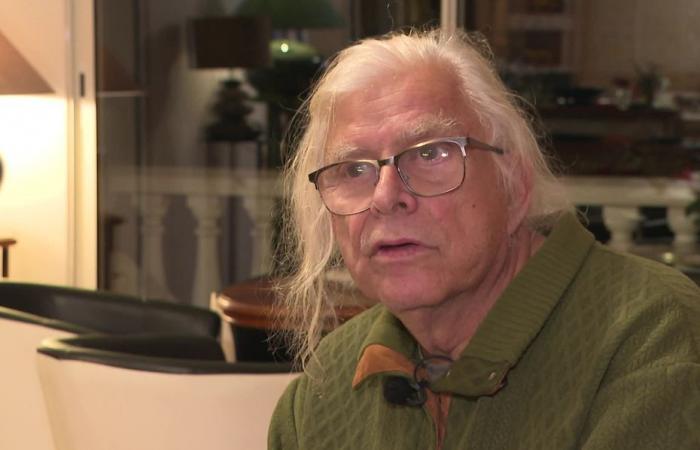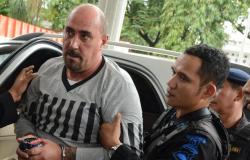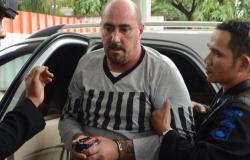Alzheimer’s disease affects up to 9,000 people in Corsica. Often, patients stay at home before their illnesses progress too significantly and are accompanied by a member of their family, called a caregiver. Two of them tell France 3 Corse ViaStella about their daily lives.
Company
From daily life to major issues, discover the subjects that make up local society, such as justice, education, health and family.
France Télévisions uses your email address to send you the “Society” newsletter. You can unsubscribe at any time via the link at the bottom of this newsletter. Our privacy policy
Marc Frant is sure of it, “sooner or later placement will be the solution, when we have exhausted ourselves”.
For three years, the retiree has taken care of his wife, Laëtitia, who suffers from Alzheimer’s disease. An illness that imposed itself on the couple’s life on a very special date. “She forgot one of my birthdays. It was at this moment that I realized”, he says.
The island does not have consolidated figures for people affected by Alzheimer’s or monitored for cognitive decline. The regional health agency counted, as of December 31, 2022, 2,938 people affected, while the France Alzheimer Foundation puts the figure at 9,000. Across the country, 900,000 people are diagnosed with Alzheimer’s disease or another related disease.
Laetitia Frant was diagnosed with Alzheimer’s disease three years ago.
•
© Marion Fiamma / FTV
The main cause of dementia, this neurological condition results from a slow degeneration of neurons. It begins in the hippocampus and then spreads to the rest of the brain. It is characterized by disorders of recent memory, executive functions and orientation in time and space.
A pathology which has already evolved in the case of Laetitia. “My wife was called the computer, that’s no longer the case. She was a private nurse so she remembered that she had 50 appointments during the day”, confides her husband.
-“For love”, Marc Frant accompanies his wife who still lives with him in Alata. “I had a normal life, now I am a home nurse day, night and weekends. She has traveled the world and now she doesn’t want to leave her house. It’s a big change.”
If he is supported by the France Alzheimer Foundation and participates in workshops dedicated to caregivers, he “knew[t] the sequel”. “It’s going to get worse. What I don’t know is how fast. When you have lived with someone for 60 years, you have to deal with it.”
Alzheimer’s disease also turned Jo Nicoli’s life upside down. The diagnosis fell for his wife, Isabelle, in 2020. She was then just 40 years old. “It goes very, very quickly because she is young, he confides. At 54, things are deteriorating at an incredible speed. She was diagnosed in 2020. Until 2022, things were pretty much going, she still drove, she went to the speech therapist, to the physiotherapist. And after 2022, it was a disaster, she became aggressive even though she had never been aggressive in her life. She said a lot of rude words, she was no longer the same person. Currently, my wife no longer speaks or recognizes much.”
Jo Nicoli’s wife, Isabelle, was diagnosed with Alzheimer’s disease in 2020. She was 50 years old.
•
© Marion Fiamma / FTV
If since the report, Isabelle has changed establishment to be closer to her family’s place of residence in the Eastern Plain, she was entrusted for a few months to the reinforced accommodation unit (UHR) of the Sartène hospital center.
The establishment offers 12 temporary places for patients with severe cognitive disorders. These patients can be followed there for a maximum of two months per year. In this structure, everything is adapted to the rhythm of the residents. The atmosphere is there “family” and the staff who work are volunteers and specially trained in neurodegenerative diseases.
“There are no obstacles here, they can walk. They wander around a lot with Alzheimer’s. There they walk all day, continues Jo Nicoli. I think structures like that are set to develop. I’m really amazed at the quality of everything. There is a doctor available 24 hours a day. There is care, physiotherapists, ortho. It’s really a relief, it’s been a lifeline, more than a lifesaver even.”
“Rescue”, because the man, helping, was exhausted. Although he went to the UHR in Sartène every day, he nevertheless affirms that he “you have to have a bit of selfishness”. “This may shock some people, but you have to say to yourself: ‘I have children, grandchildren, I am alive, I still have my health.’ There is a life behind, it’s a second life. It’s not the same, but that doesn’t take away from the one I had and have, but it’s a second life.”
These testimonies can be found, this Friday January 24 at 8:40 p.m., on France 3 Corse ViaStella in a new issue of the Sucetà magazine dedicated to Alzheimer’s disease.






